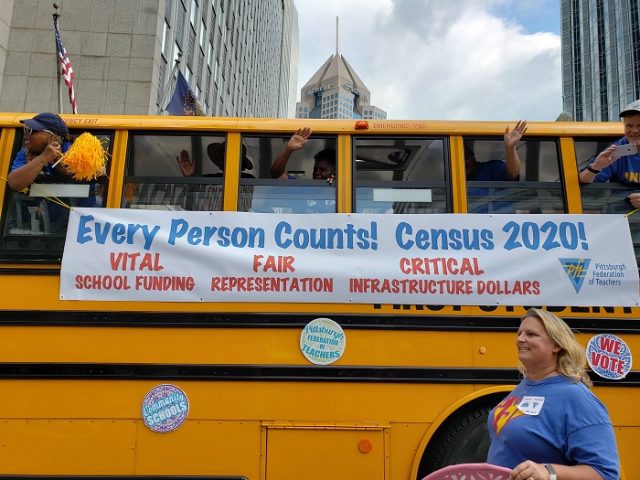
Here’s why you and your family need to be counted in the 2020 Census
This story first appeared in NEXTpittsburgh, which publishes Kidsburgh.
Like so many things, the 2020 census has gone digital.
Soon you’ll start seeing posters in doctor’s offices, libraries, bus shelters and elsewhere reminding you this is a census year. In March, you’ll get a card in the mail from the Census Bureau, urging you to go online and fill out the form for the 2020 count. It provides a number to call if you want to participate by phone, or you can request a paper copy to fill out and mail.
Census Day is April 1, the date by which everyone should have an invitation to participate. Anyone who doesn’t report voluntarily will have to do so later the old-fashioned way: with a household visit from a census worker.
It’s important to be counted, says Feyisola Akintola, special initiatives manager with the Pittsburgh Mayor’s Office, because the census defines voting districts and is tied to federal dollars for transit, education, school breakfasts and lunches, and much more. Nonprofit organizations use census data to put together grants.
“We hear feedback, ‘What has the government ever done for me?’ … So we want people to see themselves within the census,” Akintola says.
Akintola, Assistant County Manager Andréa Stanford and Jessica Mooney, Allegheny County’s manager of special projects, are leading the local 2020 census outreach effort to educate and assist people. They began two years ago by establishing a Complete Count Committee that includes a broad group of stakeholders to “make sure people understand the importance of the census, why it matters, its impact on this region and how to be counted,” says Stanford.
“It’s so important for our region to be counted. We always quote 1.2 million residents who live in Allegheny County, and we want to make sure we have an accurate count,” Stanford says.
Census Bureau estimates from 2018, released last April, showed that every county in southwestern Pennsylvania except Butler lost population since 2010. The Pittsburgh metropolitan area, which includes Pittsburgh and six surrounding counties, dropped from 26th to 27th among large metropolitan areas, and Allegheny County’s population fell 0.4 percent.
The Complete Count Committee has met several times and developed a plan of action to raise awareness about the census. That plan includes a website, becounted2020.org, which has a tool kit for organizations (Census Partners) and individuals (Census Champions) to help spread the word on social media platforms or through e-newsletters.
And some organizations such as libraries, recreation centers and churches will become Census Hubs, to provide people with access to computers and help them complete the questionnaire.
“Some households will receive a paper copy right away, but the majority will get a card asking them to go online,” says Mooney. “Our main outreach strategy is recruiting Census Hubs throughout the county. The goal is we will have 100 hubs. We’ll advertise them on our website.”
Even though the form only has 10 questions, some people might need assistance, Stanford says. “There are a lot of nuances with this year’s census that might make it a little challenging,” including households with people who might not be on a lease but are part of the household.
“We know there might be a need for additional support or encouragement or motivation to ensure they respond,” Stanford says. “We want people to be excited, quite honestly. This really is making sure our voices are represented. This is a count of our population.”
The Census Bureau begins counting homeless people in March, and works with universities, hospitals and other institutions to ensure that students living in dormitories and those in senior housing, nursing homes or hospitals are counted.
Still, the idea of the census gets mixed reviews with some people, says Mooney. A question about citizenship was blocked by the Supreme Court for the 2020 census but is asked on the annual American Community Survey.
Misinformation causes some people to worry about answering questions, Mooney says. “We want to make sure that people are really educated. ‘If I take the census, does that mean my landlord will find out the number of people living in my home, or the school system will find out my child does not attend the right school?’ People don’t necessarily understand that’s not the goal of the census.”
There’s no reason to try to opt out since the name of the person who fills out a household questionnaire is kept confidential. After 72 years, the information becomes available online, Mooney says, for uses such as ancestry searches.
Once the count is underway, the outreach committee will continue to meet, says Stanford. “It’s a vibrant group of individuals who are really committed. We were the first Complete Count Committee established in the commonwealth, and this group is in it for the long haul.”
Stay up to date on the local census effort by following the official accounts on Facebook, Twitter and YouTube.